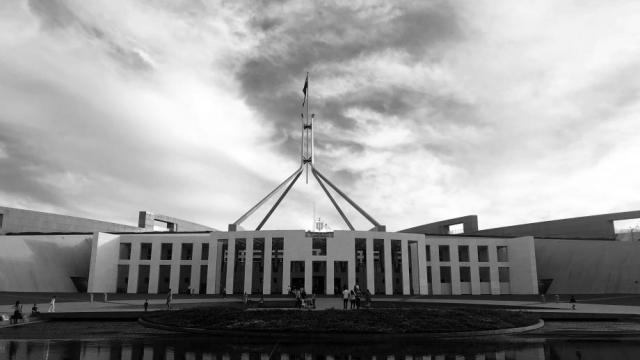Opinion: Parliament, politics, and the unity paradox

By Mark Kenny
A version of this article was originally published by The Canberra Times.
Despite moral panics over Anthony Albanese (a) not getting a sit-down with Donald Trump, and (b) getting a sit-down with Xi Jinping, the opening of the 48th Parliament should drag politics back to solidity from Tuesday.
Typically, question time is good for an opposition eager to expose government failings and garner the odd headline.
Yet in a funny way, its remnant troops will be the more apprehensive. Nervous about the chamber optics and wary of the closer media scrutiny that sitting weeks bring.
There will even be nerves about the contained proximity of traumatised colleagues spending hours in each other's company, swapping war stories from a lousy campaign, and grumbling about their stalled careers.
Things could not be more different on the other side. Labor fretted last year about being junked in just one term or "hopefully" surviving as a minority operation.
Now, processing its good fortune, the government is trying to balance obvious opportunities against hidden threats.
In politics, the problems don't get any happier than searching for the downside of taking close to two-thirds of the 150-seat House of Representatives. Labor's 94-seat haul is 51 more than the combined tally of the two Coalition partners.
Coincidentally, 51 is also the number of Labor women in the Reps, which, in turn, is 10 times the number of female Coalition MPs in the chamber, excluding the new leader, Sussan Ley. With her, there are six all up. Six.
Politics obeys the iron laws of arithmetic, as John Howard liked to say, and for Liberals, the archaic laws of the 1970s.
Ley's elevation after the Dutton debacle was the bare minimum for a party otherwise determined to remain anti-modern in its social representation. Ley becomes the first woman to head the party federally and Australia's first female opposition leader nationally.
But how safe is she given her party's dismal electoral prospects and the fact she garnered only a four-vote margin? This relied on her own vote and a trio believed to have come from people such as the eventual losing candidate in the Bradfield race, Gisele Kapterian, and moderate senators since departed.
There will be many hypercritical eyes on Ley's stewardship. Her assignment heaves with contradiction. She must aggressively take the fight up to Labor while also coaxing her colleagues back toward the centre-ground "where Australians are". Degree of difficulty, 10.
Meanwhile, in the dainty vacuum ahead of the first question time, journalists inclined to whipping any angle into soft peaks, have begun speculating about the supposedly "intriguing" match-up across the dispatch boxes between Ley and Albanese.
Learned conjecture, which is to say, uninterrogated group-think, turns on the suggestion that the gender-realignment will, of itself, force significant changes to the PM's style lest he is seen as too aggressive or dismissive.
This overstates the risks - in the absence of a serious brain-snap - and understates the reality that the onus for most parliamentary attacks falls primarily on the opposition.
Besides, I don't remember any qualms from right-wing politicians and their media spear-chuckers when Tony Abbott was Australia's most aggressive opposition leader ever.
It took an exasperated Julia Gillard in her globally famous "misogyny speech" to bell that cat. The guardians of conservative virtue and parliamentary comportment had sat gleefully on their hands.
Abbott became PM at the following election with nearly as many seats as Albanese holds now.
Of all the forums a prime minister needs to master, Albanese is most in charge in the binary theatre of the House where he understands the rules and dynamics better than most.
By far, the bigger risk for the PM now is hubris - dangerous assumptions like thinking he has a special bond with the people, that his government can inch along procedurally, and that the next election is already in the bag.
Rather, the zeitgeist suggests a need for speed and courage on reform.
Labor's dominance in the House has a potential corollary in the Senate, where a progressive majority exists if it wants to work with the Greens party. Labor sees risk here too (after Gillard), but what opportunities does this unlock?
Certainly, new conditions exist for elusive reform to improve productivity, address a long-ducked structural deficit, accelerate the decarbonisation process, and fix an intergenerational housing crisis.
Albanese, however, built his first term on the narrow delivery of election promises and will take some convincing that adventurous policy not canvassed in the '25 campaign should define his second term.
On the other hand, his stonking majority was leavened by his strategic backflip on the Morrison government's stage 3 tax cut.
Breaking that promise had served an even nobler purpose - fairness.
As Jim Chalmers hosts his productivity roundtable in Canberra in a month, some have already started fanning differences between the Treasurer and the PM.
While critics will exaggerate any signs of friction between the policy ambitions of the pair, they might remember this fact: the two longest governments since Menzies have both been characterised, even energised, by creative tensions between the PM and treasurer: Hawke-Keating and Howard-Costello.
Put another way, too much unity can kill a government as surely as division.
Mark Kenny is the Director of the ANU Australian Studies Institute and host of the Democracy Sausage podcast.








